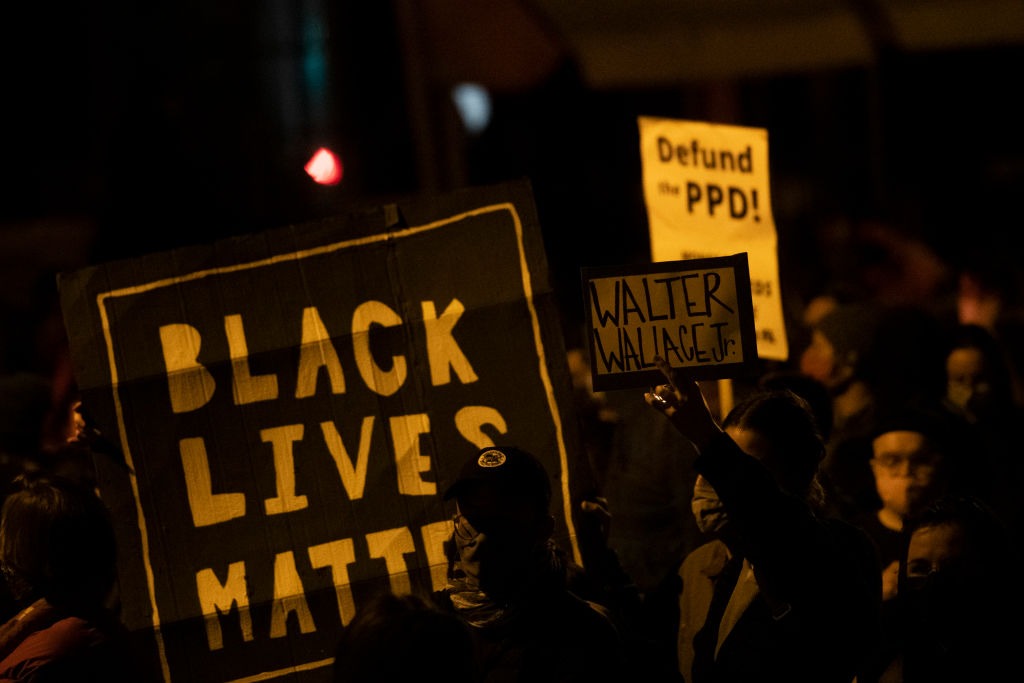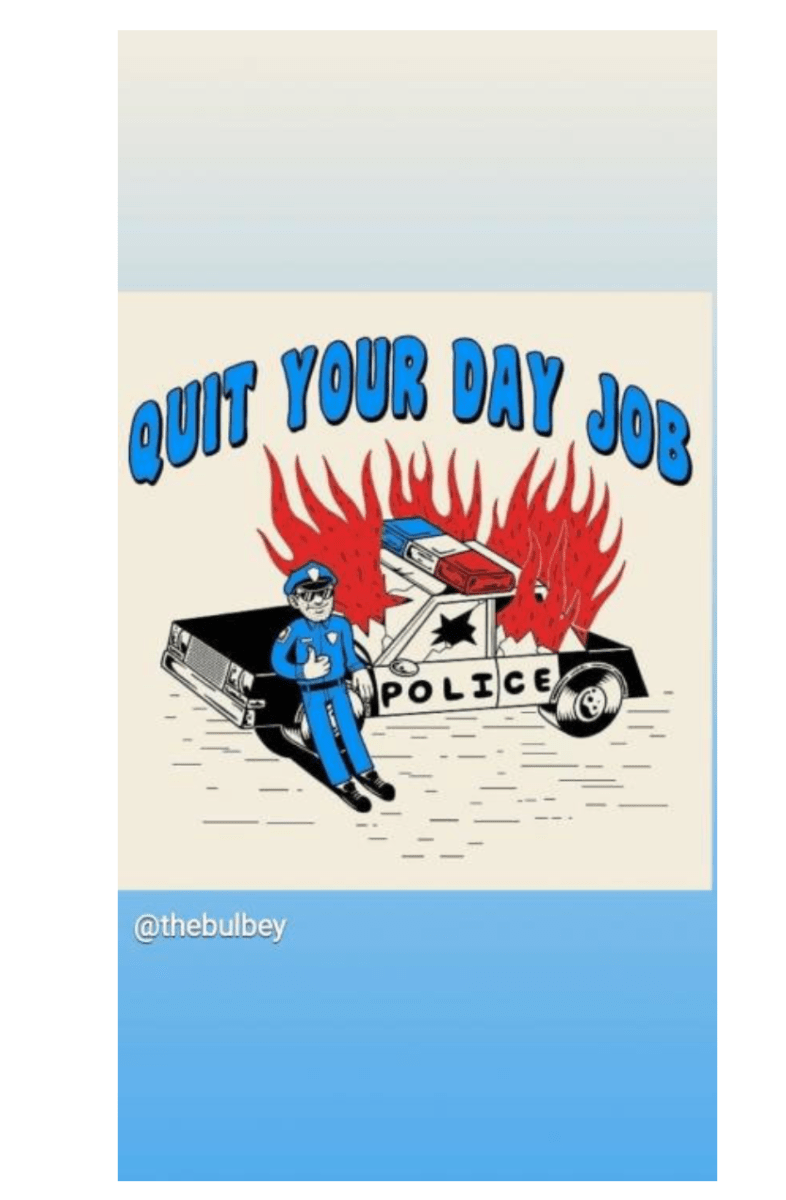Philadelphia Teacher Faces 65 Years In Prison After Another Person Torched A Police Car During A Protest
U.S Attorney William McSwain denies he’s targeted the social justice leader, but experts say prosecutors’ use of the man’s clothing and social media to argue that he should be detained pretrial is unusual.

Federal agents raided the West Philadelphia home of Anthony Smith on the morning of Oct. 28 and arrested him for allegedly aiding the destruction of a police car during racial justice protests. Federal prosecutors said Smith, a 29-year-old social studies teacher and an organizer with the Philadelphia Coalition for Racial Economic and Legal Justice, posed on May 30 for “celebratory photographs” on a flipped and spray-painted Philadelphia police vehicle and then placed “combustible materials” inside after an unnamed person lit it on fire.
Smith was hit with multiple charges in the October indictment; he faces a combined mandatory minimum sentence of seven years, and a maximum of 65 years. The raid on his home came just two days after Philadelphia police shot and killed 27-year-old Walter Wallace Jr. as his mother watched nearby. Philadelphia magazine recognized Smith this year as one of the city’s “most influential” leaders. He is also a plaintiff in an NAACP lawsuit filed over the Philadelphia Police Department’s use of chemical weapons and rubber bullets against protesters in the spring.
Smith’s case is one of nearly 300 nationwide brought by federal prosecutors against protesters over the last six months, and activists say that many of those charged have social justice backgrounds. Smith’s is also not the only case involving burning police vehicles. In late May, federal prosecutors charged two young attorneys in New York City with throwing a Molotov cocktail through the broken window of an unoccupied police car. No one was hurt—but if convicted they would face mandatory minimum sentences of 45 years in prison. In Salt Lake City, federal charges were brought against four people for flipping and burning a police car during a spring protest. Some legal experts have questioned the federal government’s decision to get involved in what are typically considered local crimes.
Carissa Byrne Hessick, a University of North Carolina law professor who studies prosecutors, says conservatives have tended to argue more often against federal prosecutions in traditionally local matters, but liberal-leaning experts have leveled those critiques more frequently during the Trump era. “The decision to bring these cases seems like part of a broader Justice Department strategy to prosecute crimes committed at these protests with a level of harshness that local officials aren’t necessarily doing,” she said. “And to deal with complaints about policing and police violence not by working with activists or trying to calm the tensions, but instead to take a very hard line law-and-order stance.”

During the late October raid, Smith, one of three men charged in the indictment, was detained at his home and sent to Lehigh County Jail. On Nov. 5, prosecutors acknowledged that Smith has “no known criminal history prior to this offense” and has “substantial ties to the community” but argued that he should be detained pretrial “following his dangerous and violent activity that has resulted in these serious federal arson charges.” In their motion for pretrial detention, prosecutors cited a June social media post by Smith, a cartoon displaying a police car on fire with the caption “quit your day job.” They also said that during the raid on Smith’s home they found a T-shirt with the phrase “[I don’t] fuck with 12” (“12” is slang for “police”).
Smith’s lawyer, Paul Hetznecker, criticized the decision by William McSwain, the U.S. attorney for the Eastern District of Pennsylvania and a President Trump appointee, to bring the charges. He called it a political stunt aimed at criminalizing dissent. “The U.S. attorney charged Smith because he’s part of a politically progressive movement and the message [Attorney General] William Barr is sending is a political one on what are traditionally state court crimes,” Hetznecker said. “It’s a dangerous abuse of federal, prosecutorial, discretionary power.”
Local activists immediately began organizing for Smith’s release, planning rallies, collecting over 8,000 petition signatures, and writing more than 70 letters of support to the judge handling the case. On Nov. 9, Hetznecker filed a court brief calling the government’s evidence that Smith poses a threat “weak and ill-conceived” and a dangerous abuse of First Amendment protected speech. Hetznecker also noted “there is not one shred of evidence” that Smith had done anything in the months since the May incident to suggest he was a danger to the community.
Shima Baughman, a criminal law professor at the University of Utah and a national expert on bail and pretrial detention, told The Appeal she has never heard of prosecutors using T-shirt slogans and social media posts as evidence for pretrial detention. But prosecutors always aim to depict defendants as “high risk,” Baughman added, because people languishing in jail pretrial are easier to negotiate with. “They’re captive audiences in jail, more likely to take whatever deal they’re offered,” she said. “And if a defendant is in pretrial detention it makes it easier for a prosecutor to then say in court ‘look, this person was deemed dangerous.’”
On Nov. 9, a federal judge ruled that Smith was not high risk, could return to his home, and continue teaching his YouthBuild Charter School students over Zoom. (Sarah Burgess, YouthBuild’s director of curriculum and instruction, testified before the judge that Smith is a “deeply valued, and respected” member of their community.)
After being released from jail, Smith posted several updates on Facebook, including one where he claimed he’s been under surveillance and that federal agents seized pictures of his loved ones during the raid on his home. “Advocating for black life can never be wrong,” he wrote in a Nov. 11 post. “Police wanted to embarrass me and ruin my name but it backfired. I got the best support system on the planet.”
Smith has a trial date scheduled for January. Hetznecker says he expects it to be delayed in part because the Eastern District of Pennsylvania has a major backlog of cases and the court has prioritized other cases during the COVID-19 pandemic.
Some advocates are hoping that the case against Smith and his co-defendants never goes to trial under a Joe Biden presidency. In September, McSwain told Philadelphia magazine that he’d resign if Trump wasn’t re-elected, and rumors are floating that he might mount a U.S. Senate bid. Although a Biden-appointed U.S. Attorney could choose to drop the charges or prosecute the defendants on different terms, Justice Department veterans say career staff members are typically loath to drop existing criminal cases, even when there’s a change in administrations.
“I think we really don’t know what’s going to happen in a Biden DOJ in part because Biden has been signaling that he wants DOJ to be more independent, but a lot of people would characterize that to mean a return to how things were before President Trump,” says Hessick. “If [Biden appointees] come in and switch course on a bunch of individual cases then it makes it seem like the decisions were initially political…The question is will folks in the department continue on in the name of normalcy when the things that they were doing are not particularly normal?”
Jennifer Crandall, a spokesperson for the U.S attorney’s office, told The Appeal that McSwain is unable to comment on the Smith case. Last month, however, McSwain told the Philadelphia CBS affiliate that “Mr. Smith was not in any way targeted by my office. I knew nothing about Mr. Smith or his affiliations until the investigation was nearly complete. We do not investigate people at the U.S. Attorney’s Office. We investigate alleged criminal behavior.”
But Hetznecker maintains the federal government made a political decision in bringing charges against Smith one week before the election, and not leaving matters to state courts where there are lesser penalties. Barr has urged his U.S. attorneys to bring charges against Black Lives Matter protesters, including charges of “seditious conspiracy.”
When asked about Smith’s case, Philadelphia District Attorney Larry Krasner told The Appeal that he “usually has little to say” about cases brought by prosecutors outside his office and noted that he expects there to be a new U.S. attorney in the Eastern District of Pennsylvania soon. “And as with any federal case, if the feds chose not to pursue it and it came back into our laps we would look at it and we would try to do individual justice,” he said. “I’m not in a position to comment on the case, but I can say that the current U.S attorney, like so many Trump appointees, has tended to be far more interested in politics than justice.”
As he awaits trial, Smith said he’s been thinking about protesters who do not have a wide base of community support. “I think about other prisoners who weren’t able to accumulate 70+ character letters,” he wrote on Facebook on Nov. 16. “Humility and kindness are very important to me. But for the innocent, and the targeted, their freedom should belong to them no matter how ‘nice’ they are.” Smith pledged to avoid being “shoved into a box of respectability” so someone else could remain incarcerated based on their personality.
